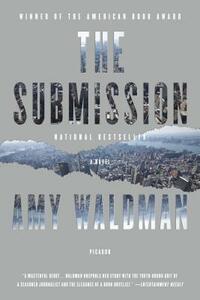Take a photo of a barcode or cover
A jury of art critics, public figures, and a family member select a design for a 9/11 memorial, and then they discover that the name of the designer is Mohammed Khan. Waldman does an excellent job switching among the perspectives of many key players as they struggle with the appropriate design and designer for the memorial. Although there are some flaws, I was struck by the complications and the stories of so many characters.
It was an interesting read, but I felt like a dead horse was beaten a few too many times.
A book about 9/11 and America. While it certainly isn't perfect, it more than makes up for its flaws. That said, some particularly annoying patterns within the work make it impossible for me to give a full five stars (perhaps a 4.5 rounded down would be appropriate). Still highly recommended reading for all...if only because it seems to tap into the nastiest, darkest tendencies of American society if not because of its touching, in-depth examination of its characters and their lives.
This first novel by a former co-chief of the South Asian bureau of the New York Times is a stunner. It's been reviewed as the 'best' novel to come out of September 11, 2001, and I would be hard pressed to disagree. With an innate understanding how we struggle with of our better, and worse, angels; of paranoia, xenophobia and self-doubt; of international affairs; of the sanctity of process; about tehe intersection of politics and honesty; of mob anger; of questions about the respect for the integrity of an artistic idea; of immigration issues; of 'otherness'; and of aspiration, Amy Waldman is wise, lucid and spot-on.
This is a book about 09/11 and a design competition to find the best possible way to memorialize the victims of the World Trade Center. The premise is that a design competition is held, with over 5,000 entries, and the selected winner turns out to be Muslim. When the winning designer is revealed to be Muslim, all hell breaks loose. It is an interesting story of "what if" that also manages to be timely, even though it's about a fictional event that would have happened in 2001.
I had worried that reading a book about 09/11, even a work of fiction as this is, would come across as dated and not standing up well to the test of time. I need not have worried. Witness this quote: "The law is political, especially right now. If the government wants to find a way to forget the Constitution and detain people without charges, it will" (pg 82). See what I mean? Even though this quote is referring to Muslims, you could easily swap out refugees or immigrants. The technical aspects of the book work well together. The book follows about 10 characters: a wealthy widow of a 09/11 victim, the feisty brother of a 09/11 victim, the man who is in charge of the memorial selection jury, the Muslim architect of the memorial, an illegal immigrant, and a newspaper reporter. These characters are mostly well-developed. The author tells each character's story a bit at a time, swapping them out from time to time. The plot plods along at a good clip. There were some anti-Muslim slurs in the book, occasional alcoholic beverages, and a hint of violence.
Overall this story was pretty good. I liked it. I wished that the plot was more quickly paced but I understand why it was so. This is a good book that will make you think, and challenge your ideas.
I had worried that reading a book about 09/11, even a work of fiction as this is, would come across as dated and not standing up well to the test of time. I need not have worried. Witness this quote: "The law is political, especially right now. If the government wants to find a way to forget the Constitution and detain people without charges, it will" (pg 82). See what I mean? Even though this quote is referring to Muslims, you could easily swap out refugees or immigrants. The technical aspects of the book work well together. The book follows about 10 characters: a wealthy widow of a 09/11 victim, the feisty brother of a 09/11 victim, the man who is in charge of the memorial selection jury, the Muslim architect of the memorial, an illegal immigrant, and a newspaper reporter. These characters are mostly well-developed. The author tells each character's story a bit at a time, swapping them out from time to time. The plot plods along at a good clip. There were some anti-Muslim slurs in the book, occasional alcoholic beverages, and a hint of violence.
Overall this story was pretty good. I liked it. I wished that the plot was more quickly paced but I understand why it was so. This is a good book that will make you think, and challenge your ideas.
Very well written -- I love it when good stories are accompanied by great writing ability. The characters were well-developed. At first I didn't like Claire's back-and-forth thinking on The Garden design, but I came to see it as important evolution in the story. The story is more about the evolution than the ending, but I really liked the ending, too.
I'm going to have to sit on this one awhile. Not sure what I really think!
Yeah...so...wow! (This is my review, as it appeared on Bookbrowse.com, October 5th, 2011.)
First time novelist, Amy Waldman, has created a gut-punch of a novel in The Submission, a tale that wonders: What would happen if the architectural design competition for the World Trade Center 9/11 Memorial was won by an American-Muslim?
The story opens two years after the attacks, with a jury deliberating over the two finalists in the Memorial Design competition - The Void and The Garden. The jury, after very tense and prolonged deliberations, finally selects its winner: The Garden. It is at this point the identity of the designer is revealed, an architect named Mohammad (Mo) Khan.
Chaos, of course, ensues as Khan's identity as an American-Muslim, is leaked to the media and citizens. Special interest groups and pundits argue for and against the fitness of both the individual and his design. Claire Burwell, whose husband died on September 11th, is a member of the jury as a representative of the families who lost loved ones in the attacks. Throughout the blind competition (the identities of those who submitted designs were kept secret), Claire was the most vocal champion for The Garden, feeling the concept offered the strongest opportunity for healing and reflection while honoring those who died. She is then thrust into an awkward and precarious position of balancing her belief in the winning design with the emotional and confrontational outbursts from the families she was supposed to be representing.
Waldman has created something I really love when reading fiction - unreliable narrators. Several main characters - Claire Burwell, Mo Khan, and Sean Gallagher - dig their heels in, waver, reevaluate themselves and others, and cause rippling consequences. Claire has long anchored her identity in liberal social thinking but has never really had to examine her convictions. Mo is arrogant and unknowable in his aloofness. He refuses, on the basis of being a free American citizen, to answer questions about his intentions with his design. This avoidance, on principle, leaves many confused and paranoid.
Sean lost his firefighter brother, Patrick, in the attacks and also lost himself. He felt he was never good enough growing up and had never really known his place in the world - until he began speaking out about his brother's death. But is that enough to give his own life meaning? All of these characters are tested and pushed to reassess their ways of thinking. Trying to make a difference in the world - which all three are striving to do - is not something that can be undertaken without fully knowing one's self.
At its heart, The Submission is a tale of caution; if you think you know yourself, please, think again. Readers are taken through a trifecta of large issues: grief, ambition, and prejudice. And early in the novel, a particular quote slapped me in the face: "You couldn't call yourself an American if you hadn't, in solidarity, watched your fellow Americans being pulverized, yet what kind of America did watching create?" It is an inescapable question. The media allowed for interminable full access, nonstop watching and reading at our disposal. Talking heads from television infiltrated our own minds. Special interest groups tore at our heartstrings. Pundits swayed our thinking this way and that. Throughout, there was never any disagreement that 9/11 was a domestic tragedy of global significance. A national embrace brought families who lost loved ones to our collective chest in an effort to support them and keep them safe. And yet. And yet there were so many competing interests fighting and often losing sight of the reason for the heightened passions and positions - the people who lost their lives.
The very title of this novel says a lot. Each character we meet is asked to submit - whether to alter a long-held belief, upend their moral center, or open a door to a stranger. The Submission also represents the architectural design Mohammad submits in hopes of creating an important work. Within a religious context, the word "muslim" means "one who voluntarily submits or surrenders to God's will." Around one simple word, so much turns. And as with Waldman's novel, a world evolves around one simple concept.
The author, a former journalist for The New York Times, and their South Asia Bureau co-chief for over three years, was in Manhattan on the the day of the attacks in 2001, and she spent the following six weeks reporting on the aftermath. Several years ago - while talking with a friend about the controversy Maya Lin endured when, in 1981, her Vietnam Veteran's Memorial design was selected through open competition - Waldman supposed that a Muslim-American planning the WTC Memorial would be a modern equivalent situation. And so, The Submission was born, as was her career as a novelist.
She has stated that in writing a story about 9/11, she "was just interested in looking at the variety of experiences and the grief. To tell the story from multiple perspectives." Waldman succeeds in achieving this goal beautifully with her debut novel; through her gifted prose and fully realized characters, she has created a very powerful reading experience.
First time novelist, Amy Waldman, has created a gut-punch of a novel in The Submission, a tale that wonders: What would happen if the architectural design competition for the World Trade Center 9/11 Memorial was won by an American-Muslim?
The story opens two years after the attacks, with a jury deliberating over the two finalists in the Memorial Design competition - The Void and The Garden. The jury, after very tense and prolonged deliberations, finally selects its winner: The Garden. It is at this point the identity of the designer is revealed, an architect named Mohammad (Mo) Khan.
Chaos, of course, ensues as Khan's identity as an American-Muslim, is leaked to the media and citizens. Special interest groups and pundits argue for and against the fitness of both the individual and his design. Claire Burwell, whose husband died on September 11th, is a member of the jury as a representative of the families who lost loved ones in the attacks. Throughout the blind competition (the identities of those who submitted designs were kept secret), Claire was the most vocal champion for The Garden, feeling the concept offered the strongest opportunity for healing and reflection while honoring those who died. She is then thrust into an awkward and precarious position of balancing her belief in the winning design with the emotional and confrontational outbursts from the families she was supposed to be representing.
Waldman has created something I really love when reading fiction - unreliable narrators. Several main characters - Claire Burwell, Mo Khan, and Sean Gallagher - dig their heels in, waver, reevaluate themselves and others, and cause rippling consequences. Claire has long anchored her identity in liberal social thinking but has never really had to examine her convictions. Mo is arrogant and unknowable in his aloofness. He refuses, on the basis of being a free American citizen, to answer questions about his intentions with his design. This avoidance, on principle, leaves many confused and paranoid.
Sean lost his firefighter brother, Patrick, in the attacks and also lost himself. He felt he was never good enough growing up and had never really known his place in the world - until he began speaking out about his brother's death. But is that enough to give his own life meaning? All of these characters are tested and pushed to reassess their ways of thinking. Trying to make a difference in the world - which all three are striving to do - is not something that can be undertaken without fully knowing one's self.
At its heart, The Submission is a tale of caution; if you think you know yourself, please, think again. Readers are taken through a trifecta of large issues: grief, ambition, and prejudice. And early in the novel, a particular quote slapped me in the face: "You couldn't call yourself an American if you hadn't, in solidarity, watched your fellow Americans being pulverized, yet what kind of America did watching create?" It is an inescapable question. The media allowed for interminable full access, nonstop watching and reading at our disposal. Talking heads from television infiltrated our own minds. Special interest groups tore at our heartstrings. Pundits swayed our thinking this way and that. Throughout, there was never any disagreement that 9/11 was a domestic tragedy of global significance. A national embrace brought families who lost loved ones to our collective chest in an effort to support them and keep them safe. And yet. And yet there were so many competing interests fighting and often losing sight of the reason for the heightened passions and positions - the people who lost their lives.
The very title of this novel says a lot. Each character we meet is asked to submit - whether to alter a long-held belief, upend their moral center, or open a door to a stranger. The Submission also represents the architectural design Mohammad submits in hopes of creating an important work. Within a religious context, the word "muslim" means "one who voluntarily submits or surrenders to God's will." Around one simple word, so much turns. And as with Waldman's novel, a world evolves around one simple concept.
The author, a former journalist for The New York Times, and their South Asia Bureau co-chief for over three years, was in Manhattan on the the day of the attacks in 2001, and she spent the following six weeks reporting on the aftermath. Several years ago - while talking with a friend about the controversy Maya Lin endured when, in 1981, her Vietnam Veteran's Memorial design was selected through open competition - Waldman supposed that a Muslim-American planning the WTC Memorial would be a modern equivalent situation. And so, The Submission was born, as was her career as a novelist.
She has stated that in writing a story about 9/11, she "was just interested in looking at the variety of experiences and the grief. To tell the story from multiple perspectives." Waldman succeeds in achieving this goal beautifully with her debut novel; through her gifted prose and fully realized characters, she has created a very powerful reading experience.
felt very superficial; I didn't connect with the characters. maybe it should have focused on a couple of them instead of spreading itself so thin. it churned on, seemingly forever - the same story could have been told much more concisely & effectively. the writing was too embellished while conveying little, and it didn't have the heart/spirit that this endlessly intriguing premise could invoke.



